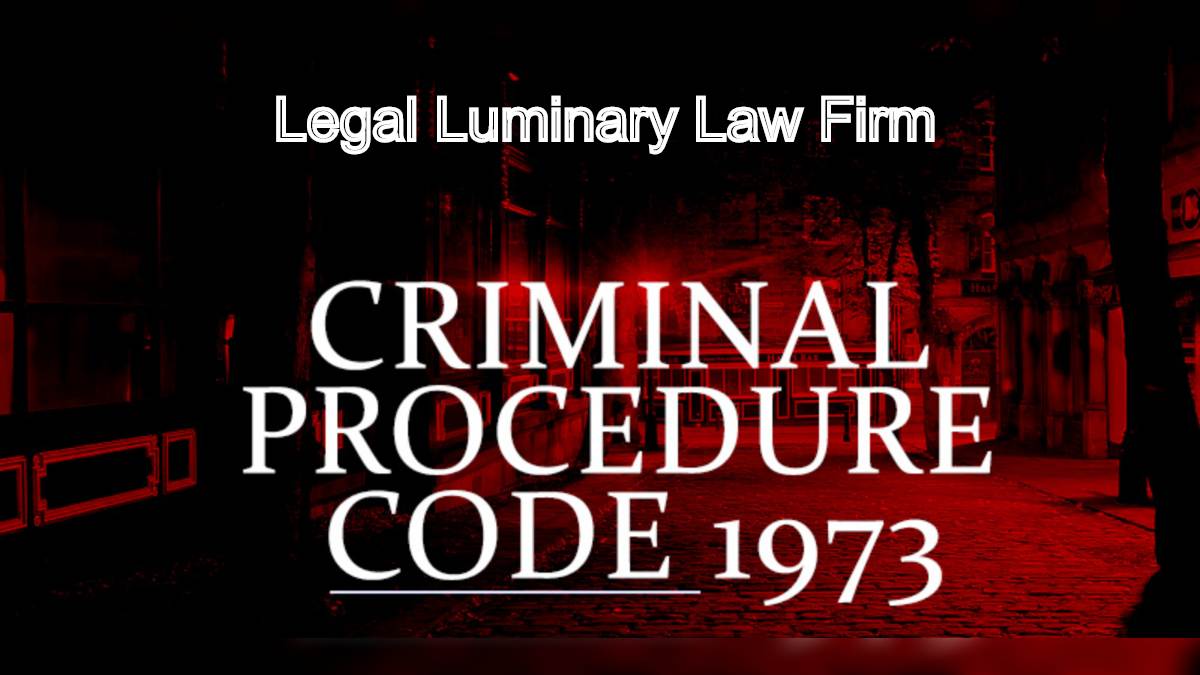Criminal Justice Unveiled: The criminal justice system plays a pivotal role in upholding law and order within a society. It ensures that those who violate established laws are held accountable for their actions. However, navigating the intricacies of this system can be daunting, particularly for those unfamiliar with legal procedures. In India, the Code of Criminal Procedure (CrPC), 1973, serves as the cornerstone for the entire criminal justice process.
Demystifying the Criminal Justice System: A Guide to India’s Code of Criminal Procedure (CrPC), 1973 with Legal Luminary Law Firm
Legal Luminary Law Firm, a leading legal firm, recognizes the importance of public awareness regarding the CrPC. We understand that knowledge empowers individuals to effectively participate in the system, whether as victims, witnesses, or accused persons. This article delves into the key aspects of the CrPC, equipping you with a basic understanding of its framework.
The Scope of the CrPC
The CrPC establishes a comprehensive framework for handling criminal cases in India. It outlines the procedures followed by law enforcement agencies during investigation, arrest, and detention. Additionally, it dictates the processes for prosecution, trial, sentencing, and appeals. By meticulously outlining each stage, the CrPC ensures fairness and due process for all parties involved.
Key Stages in a Criminal Case
Understanding the different stages of a criminal case, as defined by the CrPC, is crucial. Here’s a breakdown of the primary phases:
- First Information Report (FIR): The process often begins with the filing of an FIR. This document, lodged with a police station, details the alleged offense. The police are then obligated to investigate the complaint.
- Investigation: During the investigation stage, the police gather evidence, record statements from witnesses, and potentially arrest the accused. The CrPC lays down specific guidelines for arrest procedures, ensuring the protection of individual rights.
- Charge Sheet: If sufficient evidence is found, the police submit a charge sheet to the court, formally accusing the individual of a crime.
- Trial: The trial process involves the presentation of evidence by both the prosecution and the defense. The court then delivers a verdict, either acquitting the accused or convicting them of the offense.
- Sentencing: If convicted, the court imposes a sentence based on the severity of the crime and the CrPC’s sentencing guidelines.
- Appeal: Both the prosecution and the defense have the right to appeal the verdict or sentence to a higher court.
The Importance of Legal Representation
While this article provides a basic overview, the CrPC encompasses a multitude of complex legal intricacies. Legal Luminary Law Firm strongly recommends seeking legal representation throughout the criminal justice process. An experienced lawyer can:
- Guide You Through the Procedures: The legal system can be confusing. A lawyer can explain your rights and obligations at each stage, ensuring you navigate the process effectively.
- Protect Your Rights: The CrPC safeguards the fundamental rights of individuals. A lawyer can ensure your rights are upheld throughout the investigation and trial.
- Gather Evidence: Legal professionals possess the expertise to gather and present evidence that strengthens your case, be it for the prosecution or the defense.
- Represent You in Court: Lawyers are skilled advocates who can represent you effectively in court, ensuring your voice is heard.
Frequently Asked Questions (FAQs)
If arrested, remain calm and polite. You have the right to remain silent and to consult a lawyer. Do not answer any questions without legal counsel present.
While it’s possible to file a complaint directly with the court, it’s often recommended to involve the police for a thorough investigation. Legal Luminary Law Firm can advise you on the most appropriate course of action.
The duration of a case varies depending on the complexity of the crime and the efficiency of the court system.
The CrPC provides for the right to legal representation. If you cannot afford a private lawyer, the court can appoint one for you.
Several government websites offer resources on the CrPC. Legal Luminary Law Firm can also provide you with relevant materials and answer your specific questions.
Taking Control: Legal Luminary Law Firm by Your Side
The criminal justice system can be a complex and overwhelming experience. However, with knowledge and legal guidance, you can navigate it with greater confidence. Legal Luminary Law Firm stands by your side, offering comprehensive legal representation throughout the criminal justice process. Contact us today for a consultation and let us help you understand your rights and options.
Read More
- Four Arrested for Money Swindling in Chennai
- Unraveling Legal Evidence: Understanding the Indian Evidence Act, 1872
- Code of Civil Procedure (CPC): Expert CPC Legal Services and Attorneys
- Indian Evidence Act: The Bharatiya Sakhshya Bill
- Code of Criminal Procedure (CrPC) | Legal Luminary: Law Firm | Top Vakils in Chennai
- Ministry of Law and Justice:

